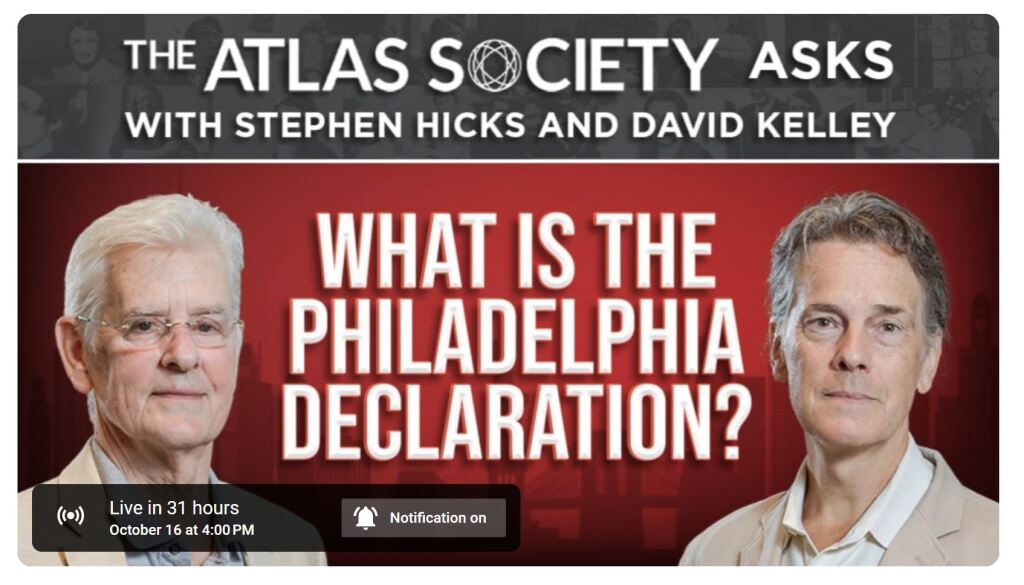
On Wednesday at 5 pm Eastern, Dr. David Kelley and I will discuss the Philadelphia Declaration of the a new 2024 venture, which seeks to mind the common cultural ground among key religious and secular groups. Its four-point mission and value statement is here:
The Philadelphia Declaration
For Freedom and Responsibility
July 13, 2024
Preamble
In April 2024, a group met in Philadelphia to discuss the direction of our country. For all its flaws, America was founded as a “melting pot” that aligned religiously and culturally diverse populations around a shared set of beliefs about the dignity and autonomy of all people.
This unity is eroding. We are becoming polarized between collectivist views on both left and right. We came together to recommit ourselves to the unifying, founding beliefs of this country, based on the rights of individuals, bringing to them a modern understanding and articulation.
Many of us differ in fundamental convictions; some of us have secular worldviews, others have religious views. But despite those differences, we share values that allow us to cooperate for mutual benefit. These values have made America great, and have inspired millions worldwide.
We believe in the morality of political freedom as the true habitat for humanity. We also share a conviction that freedom cannot be sustained without an ethical basis. We unite to clarify, celebrate, and promote the values we share as the ethical foundation needed to counter the polarization, ethical nihilism, and authoritarianism that threaten our freedom.
We believe that adopting these values will be the source of progress for our country and others throughout the world—a vibrant, exciting, and life-affirming future.
Values we stand for
- 1. Reality is the ultimate standard of true and false, including essential moral truths. Reality sets constraints on our actions and achievements, but also offers abundant possibilities for choice, achievement, and progress.
- As against… Subjectivist views that deny the reality of facts or the possibility of truth.
- 2. By nature, we are both individuals and social beings.
- * As individuals, we are defined by our unique character with the capacity for thought, choice, and agency. Only individuals think, only individuals choose, and only individuals act. The primacy of the individual means that we need and deserve the freedom to act by choice, as long as we do not use force or fraud against others. This freedom includes freedom of conscience and conviction, freedom of association with chosen others, property rights, and the moral right to the pursuit of happiness—to seek one’s best life through goals, relationships, and activities that give life meaning.
- As against… The view that we are all determined and have no individual choice or agency; and the tribal view of individuals as essentially defined by race, ethnicity, and sex—or any other form of collectivism.
- * As social beings, we value relationships with others, in families, work, civic activity, and other realms. We seek relationships for mutual benefit, and should be free to choose and earn these relationships, recognizing and honoring the obligations they involve. Families are the basis for the most intimate relationships in society, involving long-term commitments to love and care. Beyond the family, relationships of all kinds—in work, civic associations, and many others–add meaning to our lives. Relationships are fostered by benevolence toward others, gratitude for their achievements, and tolerance Mutually rewarding relationships develop best in a free society that prizes civil discourse, open inquiry, pursuit of truth, and respect for the dignity of individuals.
- As against… The notion that we are either atomistic loners or people defined by group identity, with unchosen obligations to others beyond respecting their rights.
- 3. A free society depends on citizens with agency, character, and equal dignity and rights.
- * As agents, we are each responsible for achieving our chosen goals and for dealing with the consequences of our actions. We do not have unchosen responsibilities for the actions of others.
- As against… The mindset of entitlement and victimhood that claims the unearned and flees responsibility for one’s actions.
- * Character depends on the exercise of rationality, honesty, responsibility, gratitude, courage, and benevolence—and those are the traits that enable our pursuit of happiness as individuals.
- As against…. The view that ethics and virtues are subjective and that “anything goes.”
- * We are equal in possessing dignity as human beings. We have equal rights and should be treated as equal before the law. People should be judged by “the content of their character,” not by birth, race, sex, ethnicity, or other unchosen features.
- As against… The view that divides identity groups into victims and oppressors, with “victims” having special rights and privileges; and the egalitarian ethos that defines justice by equality of outcome.
- 4. A free society is the most productive, progressive, and inclusive form of society in human history.
- * A free society enables individuals to explore boundaries, collaborate, and create value in every realm of life. The success of the innovators does not come at the expense of others; it contributes to the “flywheel” of continuous improvement that benefits everyone.
- As against… The view that progress is destructive to human well-being; and that life is a zero-sum game, with success coming at the expense of others, promoting envy and resentment toward the successful.
- * A free society depends on a government that protects individual rights in accordance with the rule of law, and with decentralized power that is limited by Constitutional restrictions.
- As against… The view that government edict and majority vote take precedence over the rights of individuals.
- * A free society provides both the incentives and the opportunities for people to cultivate the character traits that freedom requires, and to flourish in their individual lives, their relationships, and their communities.
- As against… The view that freedom is threatening and alienating; and that people are better off seeking safety in the tribe.